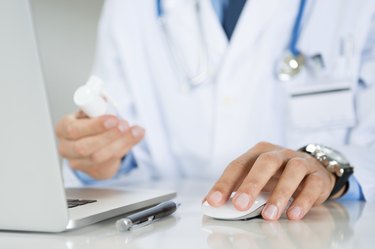
Your doctor prescribes drugs such as statins and bile acid sequestrants to reduce your risk of heart attack and stroke. Drinking alcohol while taking these medications can offset their ability to function properly and increase the side effects of the medications. Consuming alcohol in moderation may be OK depending on your situation, but anything more presents legitimate health risks.
The Good
Video of the Day
Alcohol does have some benefits for those with high cholesterol. Dr. Arthur Schoenstadt of eMedTV.com explains that if you drink alcohol in moderation, you may be less likely to experience heart disease and stroke by 25 to 40 percent. One drink, according to Schoenstadt, is a 12-ounce beer, 5-ounce glass of wine and your choice of 1 1/2 ounces of 80-proof liquor or 1 ounce of 100-proof spirits. Moderation depends on your gender. Men can enjoy two drinks per day, while women should limit themselves to one. Alcohol can increase low levels of HDL, or "good," cholesterol. This cholesterol type clears excess LDL, or "bad," cholesterol, from your blood, reducing your risk of heart attack and stroke.
Video of the Day
Breaking Down
The moment you take cholesterol medication, it begins its journey to your liver, where it is broken down. This process allows the drug to perform its intended action, which is to lower your cholesterol. Your liver then eliminates the drug from your body, preventing higher than normal amounts to remain in your system. Alcohol works against this process; it relies on your liver to break it down and to eliminate it from your body. When the alcohol breaks down first, which usually happens, the medication remains in your system longer, increasing the side effects of the drug, according to the National Institute on Alcohol Abuse and Alcoholism.
Side Effects to Consider
The American Heart Association makes it clear that alcohol can lead to high blood pressure, heart failure and a high caloric intake. The more calories you consume, the greater your risk of developing diabetes, a risk factor of high cholesterol. Perhaps the greatest alcohol-cholesterol drug interaction danger occurs when taking a statin, the most commonly prescribed cholesterol medication. You may notice an increase in the drug's common side effects such as joint and muscle pain, diarrhea, nausea and constipation. There is one rare, but serious, side effect that can develop -- liver damage. Alcohol itself can cause this, but statins can increase your liver enzymes, resulting in permanent damage. This side effect has no symptoms early on and is only detected with a blood test your doctor must order, according to MayoClinic.com.
Considerations
Schoenstadt states that while alcohol can increase your HDL it does not decrease your LDL. Consider this even if you do not take cholesterol medications. When your doctor prescribes a statin, he generally orders a liver enzyme test six weeks later, then yearly after this.mTell him if you consume alcohol regularly: He may choose to perform this blood test more frequently.
- eMedTV; Effects of Alcohol and High Cholesterol; Arthur Schoenstadt, M.D.
- MayoClinic.com; Statins: Are These Cholesterol-Lowering Drugs Right For You?; February 2010
- National Institute on Alcohol Abuse and Alcoholism; Alcohol-Medication Interactions; January 1995
- American Heart Association: Alcoholic Beverages and Cardiovascular Disease
Is this an emergency? If you are experiencing serious medical symptoms, please see the National Library of Medicine’s list of signs you need emergency medical attention or call 911.